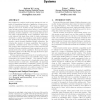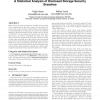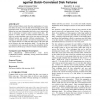92
Voted
STORAGESS
2006
ACM
15 years 8 months ago
2006
ACM
STORAGESS
2006
ACM
15 years 8 months ago
2006
ACM
This paper argues that the network latency due to synchronous replication is no longer tolerable in scenarios where businesses are required by regulation to separate their seconda...
103
click to vote
STORAGESS
2006
ACM
15 years 8 months ago
2006
ACM
This paper has three goals. (1) We try to debunk several held misconceptions about secure deletion: that encryption is an ideal solution for everybody, that existing data-overwrit...
STORAGESS
2006
ACM
15 years 8 months ago
2006
ACM
We propose a framework for examining trust in the storage stack based on different levels of trustworthiness present across different channels of information flow. We focus on ...
117
Voted
STORAGESS
2006
ACM
15 years 8 months ago
2006
ACM
New designs for petabyte-scale storage systems are now capable of transferring hundreds of gigabytes of data per second, but lack strong security. We propose a scalable and effici...
STORAGESS
2006
ACM
15 years 8 months ago
2006
ACM
151
click to vote
STORAGESS
2006
ACM
15 years 8 months ago
2006
ACM
Backing up important data is crucial. A variety of causes can lead to data loss, such as disk failures, administration errors, virus infiltration, theft, and physical damage to e...
STORAGESS
2006
ACM
15 years 8 months ago
2006
ACM
Distributed computation systems have become an important tool for scientific simulation, and a similarly distributed replica management system may be employed to increase the loc...
122
click to vote
STORAGESS
2006
ACM
15 years 8 months ago
2006
ACM
Archival storage systems are designed for a write-once, read-maybe usage model which places an emphasis on the long-term preservation of their data contents. In contrast to tradit...
128
click to vote
STORAGESS
2006
ACM
15 years 8 months ago
2006
ACM
Batch-correlated failures result from the manifestation of a common defect in most, if not all, disk drives belonging to the same production batch. They are much less frequent tha...



